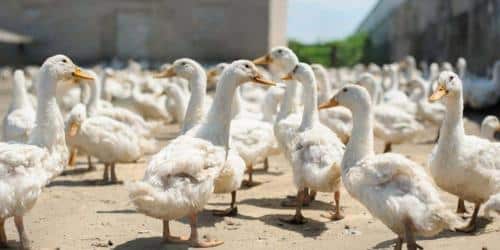Duck farming is a popular, long-standing, and profitable enterprise in many parts of the world. The term “commercial” refers to the sale of goods and services. You may create a profitable duck farming business. Duck farming is a very old and traditional business that is still extremely popular in many locations. It is an extremely simple and profitable business. In this article, we will cover all you need to know about duck farming in Nigeria.
What Is A Duck?
Duck is a common name for several species of waterfowl in the Anatidae family. Anas platyrhynchos domesticus is the scientific name for domesticated ducks. The practice of raising domesticated ducks for their meat, eggs, and feathers is known as “duck farming” in the United States. Ducks are valued for their great egg-laying potential and are a source of revenue and food for many farmers in Nigeria and Africa.
What Is the Duck Farming Business in Nigeria and Africa About?
Duck farming is a lucrative agricultural endeavor that involves raising ducks for meat and eggs. Domestic ducks, scientifically known as Anas platyrhynchos domestica, are the most prevalent commercial duck species. They have a high reproductive rate and can lay up to 200 eggs each year, making them a profitable egg production choice. Furthermore, because ducks can be raised on a small scale, they are a perfect business for smallholder farmers.
Ducks can adapt to a variety of environmental situations, according to research, and have low mortality rates and good feed conversion efficiency. Furthermore, ducks are more disease resistant than other poultry species. Duck farming is a profitable and sustainable economic enterprise due to these characteristics.
Due to its huge profit potential, duck farming is quickly gaining popularity in Nigeria and Africa. According to the Food and Agriculture Organization (FAO), Nigeria produces around 2,262,400 metric tons of poultry meat per year, with ducks accounting for a sizable portion of that total. The growing demand for duck goods in both domestic and international markets provides an opportunity for entrepreneurs to enter the duck farming sector.
With a mature duck weighing between 2-2.5kg and generating an average of 120 eggs per year, a well-managed duck farming operation can provide large earnings. Furthermore, the ducks can be raised on free-range systems, which are less expensive and require fewer inputs.
Types Of Duck Farming Businesses In Nigeria and Africa
Duck farming in Nigeria and Africa is divided into three categories: meat production, egg production, and ornamental production.
#1. Meat production
Duck farming for meat production is a sort of duck farming. It is a lucrative business with a ready market in Nigeria and Africa, where duck meat is highly regarded for its taste and nutritional content.
#2. Egg production
Duck farming for egg production entails raising ducks to lay eggs, which are then sold to consumers for eating or hatching. The demand for duck eggs is rising as a result of the country’s growing interest in the sport, and the availability of duck eggs in the United Kingdom.
#3. Ornamental production
This sort of duck farming is largely for show, with the ducks kept as pets or as ornamental displays. They are not kept for meat or eggs but for their beauty and distinct traits.
Duck farming can also be classified according to its production system, which includes extensive, semi-intensive, and intense systems. The farming system used is determined by the goal of the farming and the available resources.
How to Start Duck Farming Business
It is relatively simple to start a duck farming business. You can quickly begin commercial and small-scale production.
Before beginning commercial production, try to get training from an institute or an expert. Complete instructions will assist you in running your business successfully. Also, before you begin, attempt to create a decent duck farming business strategy. Let us now proceed to the necessary steps:
#1. Complete a Duck Farming Training
Training in duck farming is an important investment for farmers interested in this interesting profession. Farmers may enhance their profitability, production, animal care, and marketability with proper training.
There has never been a better moment to get started in the lucrative field of duck farming, with a range of training materials accessible.
As more people get interested in this lucrative industry, the importance of good training and education grows.
#2. Make An Effective Duck Farming Business Plan
Before you begin this business, you must first create a very good and successful duck farming business plan.
You should not start a business right away after thinking about it or hearing something positive about it. Instead, you should wait and develop a solid business plan. Consult with some existing farmers and ask for their assistance in developing your business plan.
Include everything about this business in your business plan, from building a house to buying ducklings and feeding them to caring for them and promoting them. And follow the plan at all times.
#3. Select A Good Location for Your Duck Farm
Choosing the right location for a duck farm is an important step in establishing a profitable operation. This business can be run successfully in a variety of settings.
The site of a duck farm has a considerable impact on the operation’s success since it influences aspects such as land availability, climate, and closeness to markets.
#4. Determine Products From Your Duck Farming Business
It is critical to identify the items. So, before you begin this enterprise, decide what things you want to produce. Ducks are highly prized for their flesh, eggs, feathers, down, foie gras, duck fat, and duck liver, among other things.
Duck farming is a successful and valued agricultural enterprise because these products are used in various cuisines and industries globally.
#5. Select Good Duck Breeds
You must choose good duck breeds for your business. There are several duck breeds available worldwide. Despite the fact that all of those breeds are unsuitable for industrial duck farming.
Some of these breeds are good for egg production, while others are good for commercial meat production. According to their production kind, ducks are often classified into three categories.
#6. Purchase Ducklings
Buying healthy ducklings is an important step in launching a successful duck farming business. Your ducklings will become productive and important members of your flock if they receive sufficient care and attention.
#7. Ensure Good Housing Facilities
A successful duck farming operation requires adequate duck housing. The term “doctor” is used to describe a person’s ability to successfully complete a task.
#8. Ensure Proper Duck Feeding
Duck feeding is an essential component of successful duck farming. The growth and development of the ducks, as well as the health and well-being of their owners, are all dependent on the ducks’ ability to maintain their health.
#9. Duck Breeding
For farmers wishing to develop their duck farming operations, breeding ducks may be a gratifying experience. It is critical to select breeding ducks based on their health, breed features, and production traits.
Duck breeding can be done artificially or organically, and both methods involve careful planning, monitoring, and care. Incubation and hatching should also be closely observed to ensure the ducklings’ health and well-being. Breeding ducks may be a profitable and successful endeavor for duck farmers with adequate planning and care.
#10. Storing Eggs is Important
It is critical to properly store duck eggs to guarantee their quality and freshness. Many people like duck eggs because of their huge size, rich flavor, and great nutritional value.
#11. Gender Determination of Ducks
Duck gender determination is critical for duck farmers and breeders looking to select the best ducks for breeding. The majority of the time, a person’s life is a product of their environment.
#12. Caring for Ducks
Duck care necessitates some knowledge and attention to their particular requirements. Whether you raise ducks for meat, eggs, or just as pets, adequate care is critical to their health and well-being. Keep in mind the following factors of duck care: housing, food and water, and health.
#13. Marketing Duck Products
Identifying your target demographic, building a brand, utilizing social media, attending farmers’ markets and events, and cooperating with local companies are all necessary steps in efficiently marketing your duck products. You may effectively promote your duck items and build your business by using these tactics.
Interesting Duck Farming Facts
Here are some interesting duck farming facts you may not be aware of.
#1. Ducks are Excellent Foragers
Ducks have a natural foraging instinct and can be highly successful at locating their own food. As a result, they require less supplemental nutrition than other livestock animals like chickens or cows. Furthermore, their foraging habits can benefit the ecosystem by helping to reduce pests and weeds.
#2. Ducks Have Waterproof Feathers
Ducks have a special oil gland near their tail that produces waterproofing oil, which they use to coat their feathers. They can swim and dive in water without getting wet or soggy because of this. It also assists in keeping them warm in chilly water.
#3. Duck Eggs are Highly Nutritious
Duck eggs are bigger and more nutritious than chicken eggs. They include more protein, iron, and other important vitamins and minerals. Furthermore, many people who are allergic to chicken eggs can eat duck eggs without incident.
Ducks are highly gregarious creatures that flourish in groups. They like associating with other ducks and have deep ties with their flock mates. This makes them interesting to keep and observe.
#5. Ducks Have a Unique Digestive System
Ducks have an unusual digestive tract that allows them to digest a wide range of foods such as insects, aquatic plants, and grains. They have a gizzard, which is a muscular organ that aids in the grinding of food before it enters their stomach. This indicates that they can take more nutrients from their food than other animals.
#6. Ducks Can Fly
While ducks are not well-known for their flying abilities, they can fly. However, most farmed ducks have had their wings removed to keep them from flying away. Wild ducks, on the other hand, have the ability to fly large distances and migrate to new sites.
#7. Ducks are Used For More Than Just Meat and Eggs
While duck meat and eggs are popular products, ducks are also used for their feathers, which are used in clothing, bedding, and other products. Additionally, duck down is a popular filling for pillows and comforters.
Is Duck Farming Profitable in Nigeria?
It is a lucrative business with a ready market in Nigeria and Africa, where duck meat is highly regarded for its taste and nutritional content. Duck farming for egg production entails rearing ducks to lay eggs, which are then sold to consumers for eating or hatching.
Can You Make Money on a Duck Farm?
Your new business can be fairly profitable as long as adequate planning and animal husbandry strategies are employed from the start. Ducks can be raised for meat or eggs, just like chickens.
How Many Eggs Does Duck Lay in a Year?
Ducks, on average, lay more eggs than hens. Commercial hens lay approximately 250 eggs per year, but commercial ducks produce 300-350 eggs per year. Large chicken eggs weigh between 24-26 ounces per dozen, while duck eggs weigh between 32-34 ounces per dozen.
What is the Best Food for Duck?
The best way to get a good deal on a car is to drive it. These foods are similar to what ducks would forage for naturally. Don’t: Leave uneaten food on the floor. Food that has rotted in the water can generate dangerous algal blooms that harm nearby wildlife.
Is Duck Richer than Chicken?
Chicken is higher in protein than duck. Chicken has 31g of protein per 100g, while duck has 18g. Both species of fowl, however, have the same protein quality because they are high in amino acids. Chicken is lower in fat than duck.
Are Duck Eggs Good to Eat?
Duck eggs are a wonderful source of nourishment in any form. Because of their dark yellow yolk, they contain more antioxidants, omega-3 fatty acids, and 50% more vitamin A than chicken eggs. Even when size is taken into account, duck eggs contain more protein than chicken eggs.
To summarize
In Nigeria and Africa, duck farming is a thriving enterprise with several economic, health, and social benefits. With increasing demand for duck products in both domestic and foreign markets, the business presents numerous options for entrepreneurs to pursue.
Starting and sustaining a successful duck farming business, on the other hand, presents its own set of obstacles that necessitate careful thinking and planning. Entrepreneurs in Nigeria and Africa can develop a profitable duck farming business by following the appropriate procedures, investing in quality equipment, and knowing market demands.
- Vegan Brands: Best 19+ Vegan Luxury Brands In 2023 (Updated).
- STARTING A BUSINESS IN TEXAS: Checklist, Costs, and Requirements
- Carhartt Logo: Evolution & All You Need
- HUNTING BRANDS: A Collection of the Best Hunting Brands for Beginners and Pros
- Best Online Business Ideas to Try Out in Nigeria 2023






